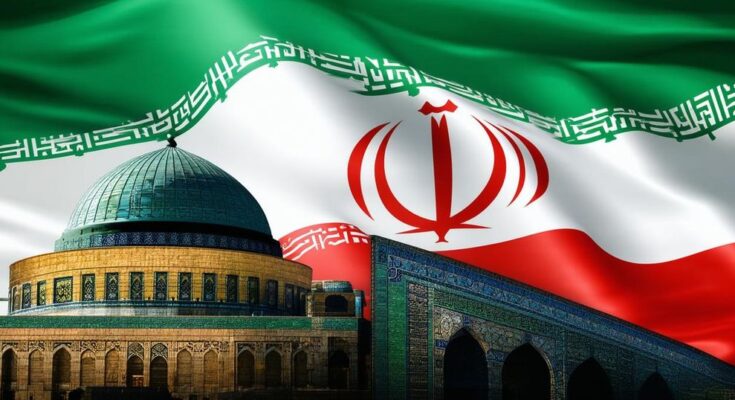Amid increasing violence in the Middle East and faltering U.S. diplomatic efforts, Arab allies are re-engaging with Iran to prevent a broader conflict. Key meetings between Iranian officials and Gulf leaders mark a shift in regional dynamics, as these nations strive to balance relations and interests while navigating heightened tensions with Israel. The growing skepticism toward U.S. security guarantees complicates this landscape, underscoring a need for effective diplomacy and regional stability.
The recent escalation of violence in the Middle East has prompted a noticeable shift in the foreign policy strategies of Washington’s Arab allies as they engage more actively with Iran, considered their principal regional adversary. As tensions spiral and the efficacy of U.S. interventions wanes, a select number of Arab nations have revived diplomatic ties with Tehran in a bid to prevent a broader conflict across the region. U.S. Secretary of State Antony Blinken’s recent visit to Israel, marking his eleventh trip in just one year, underscores ongoing American efforts to mediate a ceasefire in Gaza following Turkey’s actions against Hamas. However, U.S. calls for de-escalation have not resonated effectively, especially as Israeli leaders express intent to persist in their military operations in both Gaza and Lebanon. Israel now faces Iran’s retaliation, which notably includes a barrage of missiles launched against it on October 1 in response to recent Israeli assaults on Hezbollah and Hamas leaders. Traditional suspicions towards Shiite Iran have long characterized the relationship between Sunni Arab states and the Islamic Republic, particularly regarding Iran’s backing of various Islamist militant groups. Nonetheless, recent Iranian overtures toward its Arab neighbors indicate a strategic pivot as it seeks to mitigate conflict with them while advocating for its interests against Israel. Diplomatic engagements have intensified, as seen in high-profile meetings involving Saudi Arabia’s Crown Prince Mohammed bin Salman and Iranian officials. This diplomatic outreach by Iran, represented by Foreign Minister Abbas Araghchi, has included discussions with leaders from Jordan, Egypt, Qatar, Oman, and Bahrain, focusing on assuring those nations of their security and non-involvement in hostilities against Iran. Such reassurances reflect a consensus among these nations to remain neutral and avoid being drawn into conflict. As Israel seeks to diminish the influence of groups like Hezbollah and Hamas—seen as adversaries by several Arab states—concerns about the ramifications of an uncontained regional conflict persist. While the Gulf Arab monarchies acknowledge certain benefits in the weakening of these groups, there is trepidation regarding Israel’s strategic escalation in the region. Key Gulf leaders, including First Deputy Prime Minister of the UAE Anwar Gargash, emphasize the urgency for a robust American response to ensure stability and security through a ceasefire in Gaza and Lebanon. The ambivalence among Gulf states regarding U.S. commitments has intensified amidst a perceived U.S. retrenchment from the Middle East, compounded by a series of aggressive incidents involving Iranian-aligned groups. There is a growing sentiment of skepticism towards U.S. assurances of protection, especially after the U.S. failed to intervene during attacks on Saudi and Emirati infrastructure. Despite such unease, these countries are still reliant on U.S. military ties, seeking formalized security agreements to solidify their defense posture. The broader geopolitical landscape suggests that as Gulf Arab countries navigate these tensions, there remains a fragile balance between engaging with Iran and maintaining solidarity in their Western alliances.
The article provides insight into the shifting dynamics of Middle Eastern diplomacy amid escalating tensions involving the United States, Israel, and Iran. With growing instability in the region, traditional adversaries are reevaluating their foreign policy strategies, particularly in response to perceived failures of U.S. intervention. The historical context of Arab-Iranian relations, characterized by suspicion and rivalry, now encounters a new paradigm where diplomatic engagement is prioritized to avert larger conflicts. This change reflects the complex geopolitical landscape wherein Arab states seek to protect their national interests while managing regional power struggles and alliances.
In conclusion, the changing landscape of Middle Eastern relations underscores a critical juncture in which Arab nations are increasingly engaging with Iran amid growing disenchantment with U.S. efforts to mediate tensions. As these nations navigate their foreign policies, balancing historical adversities with a pragmatic approach to diplomacy, the broader implications for regional stability remain uncertain. The successful mitigation of conflict hinges not only on Arab-Iranian relations but also on the re-evaluation of U.S. roles and commitments in the Middle East.
Original Source: www.cnn.com




